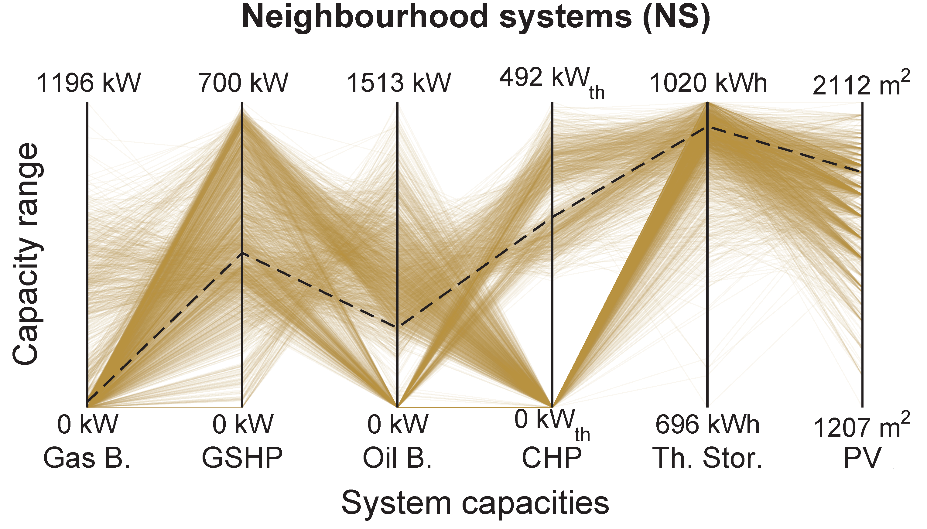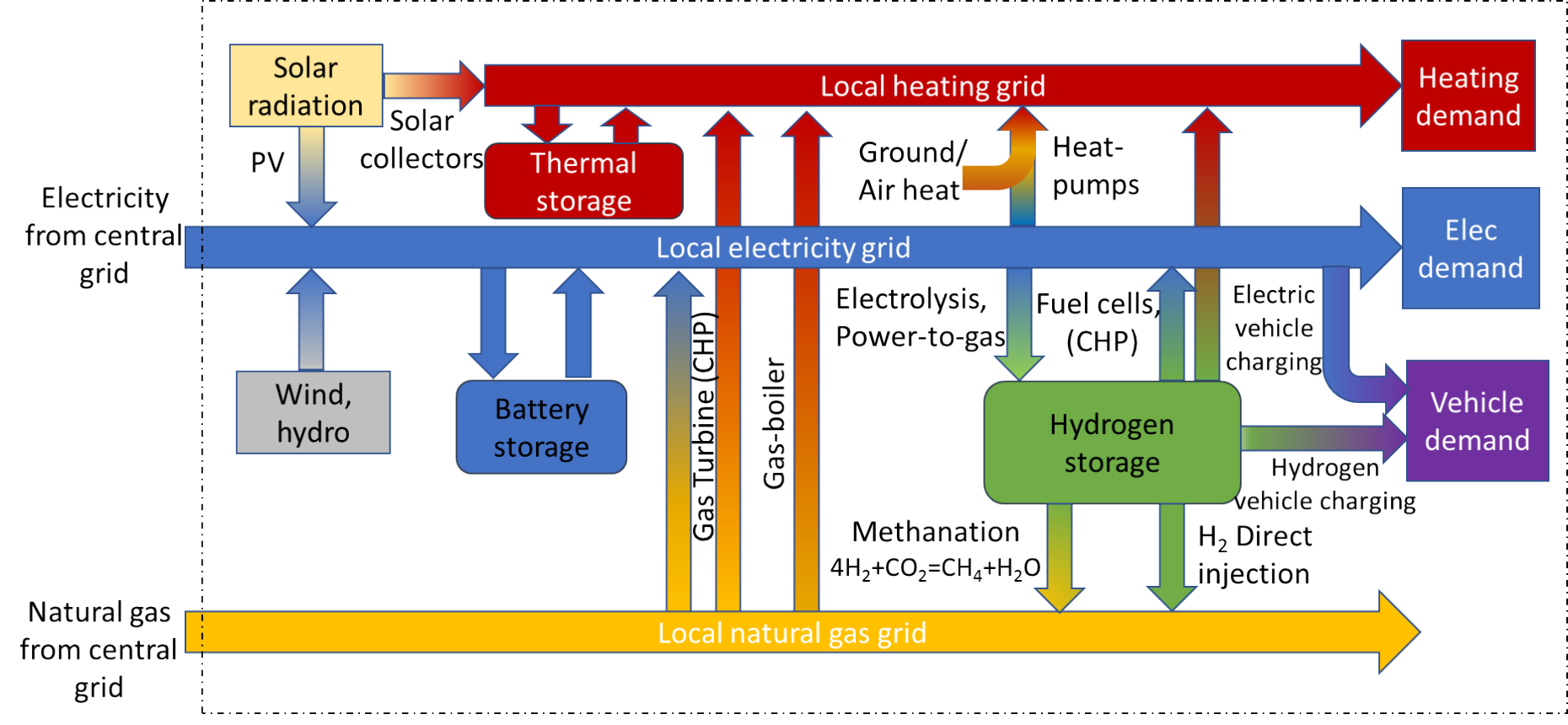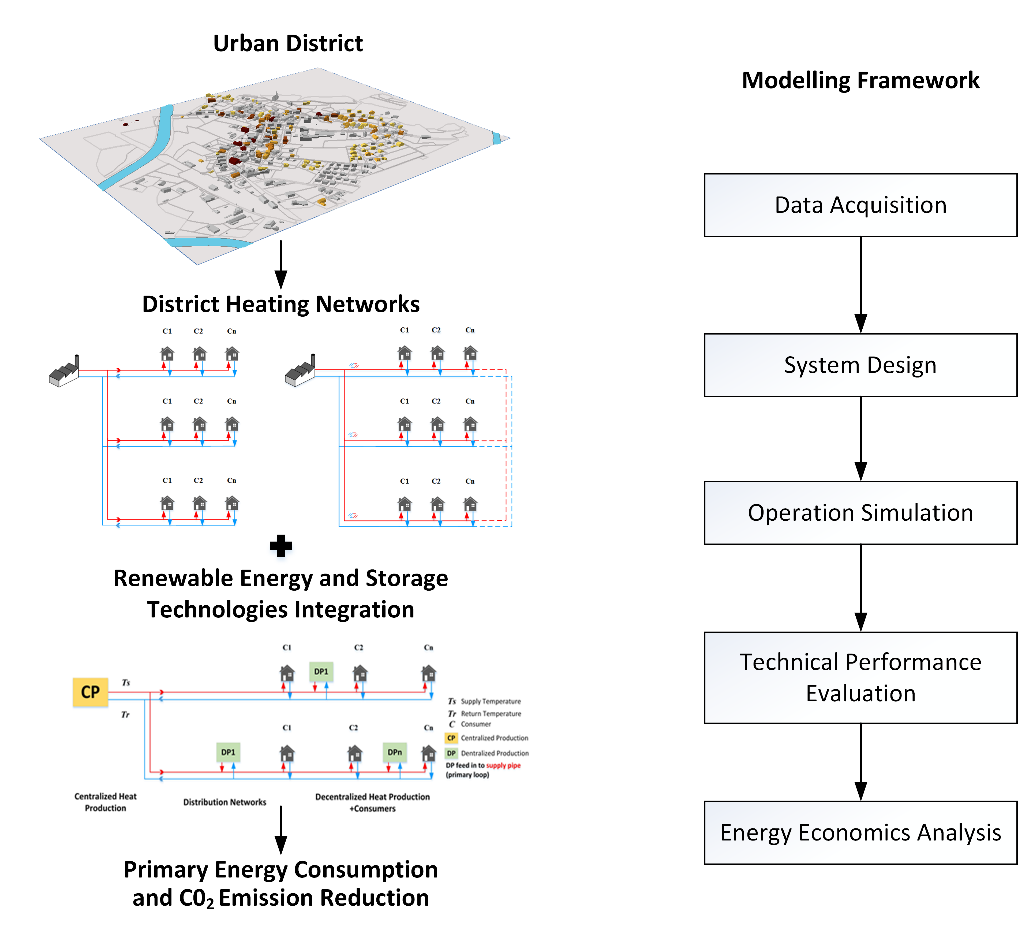Energy system modelling and optimization
The increasing penetration of renewable energy sources (e.g. solar, wind) into district energy systems for urban communities necessitates the adoption of storage technologies to shift the renewable energy supply to the urban energy demand. In a successive step, comprehensive simulation and optimisation approaches are developed to assess system performance, economic feasibility, and design of novel energy supply systems.
Renewable powered district heating networks (RePoDH)
In the urban context, the utilization of thermal networks for the distribution of heat to buildings has proven to be an energy efficient method for satisfying the heating demand of multiple distributed consumers with varying usage patterns. However, while thermal networks can be a useful solution, it is often a challenge to integrate multiple energy resources into district heating systems. Especially when the temperature dynamics of the different energy conversion technologies are accounted for. As a result, the development of a robust design methodology for district heating systems is a demanding task. The SNF project RePoDH aims to deepen the knowledge in this area by developing a modelling framework to design district-heating networks powered by renewable conversion technologies (e.g. solar thermal collectors, low energy sources with heat pumps), in combination with short and long-term storage technologies (e.g. hot water storage tanks, boreholes). An assessment of the different DHS configurations is performed based on specific performance indicators such as renewable share, overall system losses, and CO2 emissions.
Design of distributed urban energy systems under uncertainty
The effective design of distributed urban energy systems is hindered by uncertainty, which can be traced in aspects like the stochastic nature of renewable energy or the unknown future energy prices. Any design decisions that are made ignoring uncertainty can potentially be rendered suboptimal if the conditions assumed during the design stage deviate due to uncertainty from the actual conditions during the system’s operating phase.
To address the issue of uncertainty, computational techniques are combined with the energy hub concept in order to investigate uncertainty’s impacts on the optimal design of urban energy systems (Uncertainty Analysis) as well as the most influential uncertainty sources (Sensitivity Analysis). Additionally, extensions to the deterministic energy hub modelling framework are developed that allow for optimal and robust system design decisions to be made under uncertainty (Stochastic and Robust Optimization).

Integration of sustainable multi-energy HUB systems (IMES): power to gas for district energy systems
Due to the phase out of centralized fossil fuel and nuclear power plants in favour of renewable generation in Switzerland, new solutions are predicted to shift power grids towards a structure of decentralized energy systems (DES). Distributed storage is an asset in DES design as it can mitigate stochastic fluctuations in renewable generation by shifting surpluses to future demand. Currently, the majority of DES models focus on batteries or thermal tanks as a storage medium, while power-to-gas (P2G) storage, in which excess electricity is converted to storable hydrogen gas via electrolysis, is typically reserved for large renewable facilities. However, P2G is also an attractive storage option at the community level, as it facilitates long-term storage with high energy density. The research project IMES-BP (SNF NFP70) attempts to address this oversight by applying P2G as a long-term storage solution in DES modelling. The DES model is based on the energy hub concept, with new elements introduced to accurately represent P2G technology.

References
Allegrini J, Orehounig K, Mavromatidis G, Ruesch F, Dorer V, Evins R. (2015) A review of modelling approaches and tools for the simulation of district-scale energy systems. Renewable and Sustainable Energy Reviews, Vol 52, 1391-1404.
Mavromatidis G, Orehounig K, Carmeliet J. (2015) Climate change impact on the design of urban energy systems. In: International Conference Future Buildings & Districts, Sustainability from Nano to Urban Scale, CISBAT 2015, Lausanne, Switzerland, September 9th – 11th 2015.
Mavromatidis G, Orehounig K, Carmeliet J. (2016) Uncertainty and sensitivity analysis for the optimal design of distributed urban energy systems. In: Sustainable Built Environment Conference, SBE16, Zurich, Switzerland, June 13th – 17th 2016.
Omu A, Hsieh S, Orehounig K. (2016) Mixed integer linear programming for the design of solar thermal energy systems with short-term storage. Applied Energy 180, 313-326.
Orehounig K, Evins R, Dorer V. (2015) Integration of decentralized energy systems in neighbourhoods using the energy hub approach. Applied Energy, Vol 154, 277-289.
Orehounig, K., Mavromatidis, G., Evins, R., Dorer, V., Carmeliet, J. (2014) 'Towards an energy sustainable community: an energy system analysis for a village in Switzerland' Energy and Buildings, Vol 84, 277-286.
Wu R, Mavromatidis G, Orehounig K. (2016) Reliability Optimisation of a District Multi-Energy System. In: 19. Status-Seminar, ETH Zurich, Switzerland, September 8th – 9th 2016
Wu R, Mavromatidis G, Orehounig K, Carmeliet J. (2017) Multiobjective Optimisation of Energy Systems and Building Envelope Retrofit in a Residential Community. Applied Energy, 190, 634-649
